-
 Bitcoin
Bitcoin $82,939.8540
-1.12% -
 Ethereum
Ethereum $1,790.1968
-1.04% -
 Tether USDt
Tether USDt $0.9996
0.00% -
 XRP
XRP $2.1322
0.32% -
 BNB
BNB $592.4750
-0.76% -
 Solana
Solana $118.3109
-2.85% -
 USDC
USDC $1.0000
0.01% -
 Dogecoin
Dogecoin $0.1683
-1.60% -
 Cardano
Cardano $0.6513
-1.43% -
 TRON
TRON $0.2377
-0.97% -
 UNUS SED LEO
UNUS SED LEO $9.0742
-4.17% -
 Chainlink
Chainlink $12.6773
-1.82% -
 Toncoin
Toncoin $3.3268
-1.48% -
 Stellar
Stellar $0.2503
-3.53% -
 Avalanche
Avalanche $17.8932
-0.77% -
 Shiba Inu
Shiba Inu $0.0...01222
-0.32% -
 Sui
Sui $2.2152
-2.74% -
 Hedera
Hedera $0.1612
-2.25% -
 Litecoin
Litecoin $82.2295
-2.55% -
 Polkadot
Polkadot $3.9361
-3.10% -
 MANTRA
MANTRA $6.2831
-0.04% -
 Bitcoin Cash
Bitcoin Cash $298.7688
-0.22% -
 Dai
Dai $1.0001
0.02% -
 Bitget Token
Bitget Token $4.4367
-2.42% -
 Ethena USDe
Ethena USDe $0.9990
-0.02% -
 Pi
Pi $0.5933
10.29% -
 Monero
Monero $215.1864
-0.04% -
 Hyperliquid
Hyperliquid $11.7309
-0.93% -
 Uniswap
Uniswap $5.8023
-1.26% -
 OKB
OKB $51.5001
6.22%
Comparison of digital currency storage solutions: the advantages and disadvantages of hot wallets and cold wallets
Hot wallets offer convenience for daily crypto transactions but are vulnerable to hacks, while cold wallets provide superior security for long-term storage.
Apr 04, 2025 at 01:57 pm
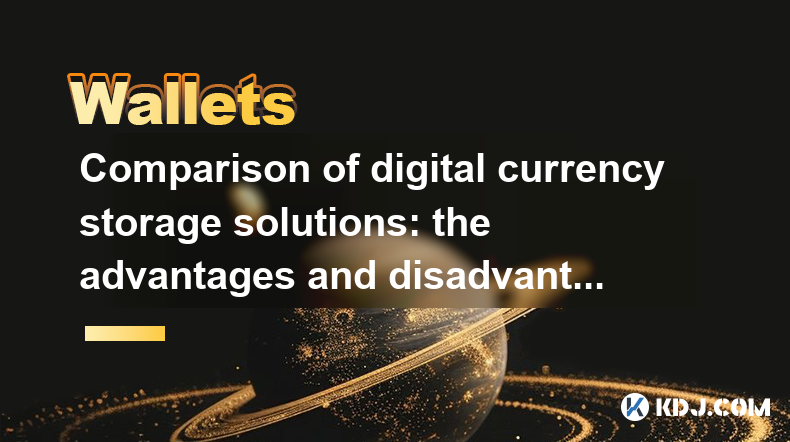
In the world of cryptocurrencies, securing your digital assets is paramount. One of the key decisions you'll face is choosing between hot wallets and cold wallets for storing your digital currencies. Each type of wallet offers distinct advantages and disadvantages, and understanding these can help you make an informed decision tailored to your needs. This article will delve into the specifics of hot wallets and cold wallets, comparing their features, security levels, convenience, and cost to help you determine which solution best fits your cryptocurrency storage needs.
What are Hot Wallets?
Hot wallets are digital currency storage solutions that are connected to the internet. They are designed for ease of use and quick access to your cryptocurrencies, making them ideal for frequent transactions. Hot wallets can be further categorized into software wallets, which are installed on your computer or mobile device, and web wallets, which are hosted by a third party on the internet.
- Software Wallets: These are applications you download and install on your device. Examples include Exodus, Electrum, and MyEtherWallet.
- Web Wallets: These are accessible through a web browser and managed by a third party. Examples include Coinbase and Blockchain.com.
Hot wallets are convenient for everyday use because they allow you to quickly send and receive cryptocurrencies. However, their constant connection to the internet makes them more vulnerable to hacking and cyber attacks. Therefore, while they are user-friendly, they are not the best choice for storing large amounts of digital assets long-term.
Advantages of Hot Wallets
Hot wallets offer several advantages that make them popular among cryptocurrency users. Here are some of the key benefits:
- Convenience: Hot wallets are easy to set up and use. You can access your funds quickly and easily, making them ideal for daily transactions.
- Accessibility: Since hot wallets are connected to the internet, you can access them from any device with an internet connection. This makes them highly convenient for users who need to manage their cryptocurrencies on the go.
- User-Friendly Interface: Many hot wallets come with intuitive interfaces that make it easy for beginners to navigate and manage their digital assets.
- Integration with Exchanges: Some hot wallets are integrated with cryptocurrency exchanges, allowing you to trade directly from your wallet without needing to transfer funds to another platform.
Disadvantages of Hot Wallets
Despite their convenience, hot wallets come with several drawbacks that users should be aware of:
- Security Risks: Being connected to the internet, hot wallets are more susceptible to hacking, phishing, and malware attacks. If a hacker gains access to your device or the wallet's server, they can steal your funds.
- Dependence on Third Parties: Web wallets, in particular, rely on third-party services to manage your funds. If the service provider experiences a security breach or goes bankrupt, you could lose your cryptocurrencies.
- Limited Control: With web wallets, you have less control over your private keys, which are essential for accessing your funds. This can be a significant concern for users who prioritize security and privacy.
What are Cold Wallets?
Cold wallets, on the other hand, are offline storage solutions for digital currencies. They are not connected to the internet, which significantly reduces the risk of hacking and cyber attacks. Cold wallets can be categorized into hardware wallets and paper wallets.
- Hardware Wallets: These are physical devices that store your private keys offline. Examples include Ledger Nano S, Trezor, and KeepKey.
- Paper Wallets: These involve printing your private keys and public addresses on a piece of paper. While less common, they are a low-cost option for offline storage.
Cold wallets are considered the most secure way to store cryptocurrencies, making them ideal for long-term storage and large amounts of digital assets. However, they are less convenient for frequent transactions due to the need to connect them to a device to access your funds.
Advantages of Cold Wallets
Cold wallets offer several advantages that make them the preferred choice for many cryptocurrency investors. Here are some of the key benefits:
- Enhanced Security: Since cold wallets are not connected to the internet, they are immune to online hacking attempts. This makes them the safest option for storing large amounts of cryptocurrencies.
- Full Control: With cold wallets, you have complete control over your private keys. This means you are not reliant on third-party services, reducing the risk of losing your funds due to external factors.
- Long-Term Storage: Cold wallets are ideal for long-term storage of digital assets. You can store your cryptocurrencies offline for years without worrying about security breaches.
- Backup and Recovery: Many hardware wallets offer robust backup and recovery options, allowing you to restore your wallet if you lose your device.
Disadvantages of Cold Wallets
Despite their superior security, cold wallets also have some drawbacks that users should consider:
- Inconvenience: Cold wallets are less convenient for frequent transactions. You need to connect your hardware wallet to a device to access your funds, which can be time-consuming.
- Cost: Hardware wallets can be expensive, with prices ranging from $50 to $200. While paper wallets are free, they are less secure and more difficult to manage.
- Learning Curve: Using cold wallets, especially hardware wallets, can be more complex than using hot wallets. You may need to spend time learning how to set up and use your wallet properly.
- Physical Loss or Damage: Since cold wallets are physical devices, there is a risk of losing them or having them damaged. If you lose your hardware wallet without a backup, you could lose access to your funds permanently.
Comparing Hot Wallets and Cold Wallets
When deciding between hot wallets and cold wallets, it's essential to consider your specific needs and priorities. Here's a detailed comparison of the two types of wallets:
- Security: Cold wallets offer superior security due to their offline nature. They are the best choice for storing large amounts of cryptocurrencies long-term. Hot wallets, while convenient, are more vulnerable to hacking and cyber attacks.
- Convenience: Hot wallets are more convenient for everyday use. They allow quick and easy access to your funds, making them ideal for frequent transactions. Cold wallets, on the other hand, require more effort to access your funds, making them less suitable for daily use.
- Cost: Hot wallets are generally free or low-cost, especially if you use a web wallet. Cold wallets, particularly hardware wallets, can be more expensive, with prices ranging from $50 to $200. Paper wallets are free but less secure.
- Control: Cold wallets give you full control over your private keys, reducing reliance on third-party services. Hot wallets, especially web wallets, may require you to trust a third party with your funds, which can be a concern for some users.
- Accessibility: Hot wallets are highly accessible, as you can use them from any device with an internet connection. Cold wallets are less accessible, as you need to physically connect your hardware wallet to a device to access your funds.
Choosing the Right Wallet for Your Needs
Choosing the right wallet depends on your specific needs and priorities. Here are some factors to consider when making your decision:
- Frequency of Transactions: If you frequently buy, sell, or trade cryptocurrencies, a hot wallet may be more suitable due to its convenience. If you are a long-term investor who rarely touches your funds, a cold wallet is likely a better choice.
- Amount of Cryptocurrency: If you hold a large amount of cryptocurrencies, a cold wallet is the safest option. For smaller amounts that you use regularly, a hot wallet may be sufficient.
- Security Concerns: If security is your top priority, a cold wallet is the best choice. If you are willing to trade some security for convenience, a hot wallet may be more suitable.
- Budget: If you are on a tight budget, a hot wallet or a paper wallet may be more affordable. If you can afford the cost, a hardware wallet offers the best balance of security and convenience.
Common Questions About Hot Wallets and Cold Wallets
Q: What is the main difference between a hot wallet and a cold wallet?
A: The main difference is their connection to the internet. Hot wallets are connected to the internet, making them convenient for frequent transactions but more vulnerable to hacking. Cold wallets are offline, offering superior security but less convenience for daily use.
Q: Can I use both a hot wallet and a cold wallet?
A: Yes, many cryptocurrency users use both types of wallets. You can store the majority of your funds in a cold wallet for long-term security and keep a smaller amount in a hot wallet for daily transactions.
Q: Are hardware wallets worth the cost?
A: For users who prioritize security and hold significant amounts of cryptocurrencies, hardware wallets are worth the cost. They offer the best balance of security and convenience for managing your digital assets.
Q: How do I set up a paper wallet?
A: To set up a paper wallet, you need to generate a public address and private key using a secure offline computer. You can then print these on a piece of paper and store it in a safe place. Be sure to use a printer that is not connected to the internet to avoid security risks.
Q: What should I do if I lose my hardware wallet?
A: If you lose your hardware wallet, you can restore your funds using the recovery seed phrase provided when you set up your wallet. It's crucial to store this seed phrase in a secure location separate from your hardware wallet.
Q: Can I use a hot wallet on multiple devices?
A: Yes, many hot wallets, especially software wallets, can be used on multiple devices. However, you should ensure that all devices are secure to minimize the risk of hacking.
Q: How do I transfer funds from a cold wallet to a hot wallet?
A: To transfer funds from a cold wallet to a hot wallet, you need to connect your cold wallet to a device, initiate the transaction, and confirm it using your cold wallet. The process may vary depending on the specific wallets you are using.
Q: Are there any alternatives to hot and cold wallets?
A: Yes, there are other storage solutions, such as multi-signature wallets, which require multiple private keys to authorize a transaction, and custodial wallets, where a third party holds your funds. Each has its own set of advantages and disadvantages.
Q: How do I ensure the security of my hot wallet?
A: To ensure the security of your hot wallet, use strong passwords, enable two-factor authentication, keep your software up to date, and be cautious of phishing attempts. Regularly transferring funds to a cold wallet can also reduce the risk of losing your entire balance to a hack.
Q: What are the risks of using a paper wallet?
A: The main risks of using a paper wallet include physical loss or damage, as well as the potential for someone to steal the paper if it's not stored securely. Additionally, if you use an insecure method to generate the paper wallet, it could be compromised by malware.
Disclaimer:info@kdj.com
The information provided is not trading advice. kdj.com does not assume any responsibility for any investments made based on the information provided in this article. Cryptocurrencies are highly volatile and it is highly recommended that you invest with caution after thorough research!
If you believe that the content used on this website infringes your copyright, please contact us immediately (info@kdj.com) and we will delete it promptly.
- Titan CEO Chris Chung Calls on Crypto Industry to Establish Ethical Norms Through Social Consensus
- 2025-04-06 02:20:12
- CRV Price Prediction: Bullish Preference for CRV, Citing Its Recent Rebound from a Key Support Level
- 2025-04-06 02:20:12
- Newsmax (NYSE:NMAX) IPO Priced at $10 a Share, Opens 735% Above IPO Price
- 2025-04-06 02:15:12
- Amid the ongoing Trump tariff war, the cryptocurrency market has experienced a major pullback during the last month of Quarter 1 (Q1) 2025.
- 2025-04-06 02:15:12
- With Trump's new tariff announcement coming on April 3, the crypto market reacted with fear and saw a decline.
- 2025-04-06 02:10:12
- Members of the Trump family are further cozying up to cryptocurrencies.
- 2025-04-06 02:10:12
Related knowledge
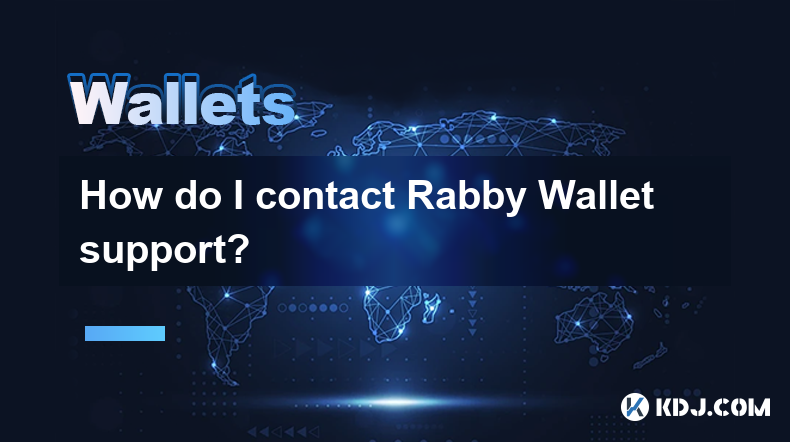
How do I contact Rabby Wallet support?
Apr 04,2025 at 08:42am
Introduction to Rabby Wallet SupportIf you are a user of Rabby Wallet and need assistance, knowing how to contact their support team is crucial. Rabby Wallet offers various methods to reach out for help, ensuring that users can get the support they need efficiently. This article will guide you through the different ways to contact Rabby Wallet support, ...
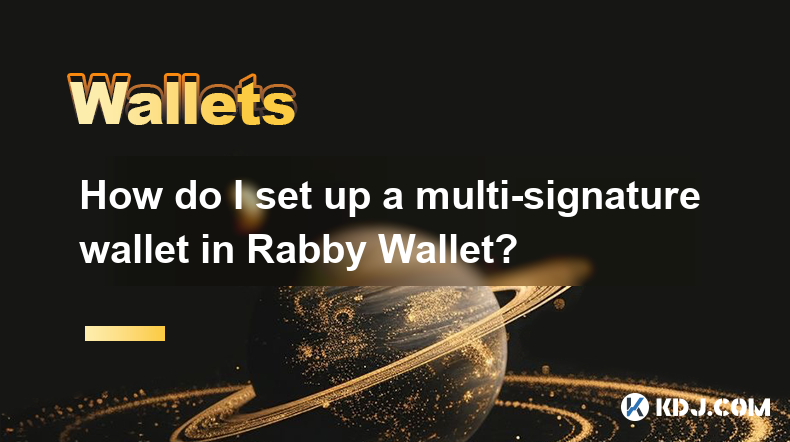
How do I set up a multi-signature wallet in Rabby Wallet?
Apr 05,2025 at 06:49pm
Setting up a multi-signature wallet in Rabby Wallet involves several detailed steps to ensure security and functionality. A multi-signature wallet requires multiple private keys to authorize a transaction, adding an extra layer of security. Here's a comprehensive guide on how to set up a multi-signature wallet in Rabby Wallet. Understanding Multi-Signat...
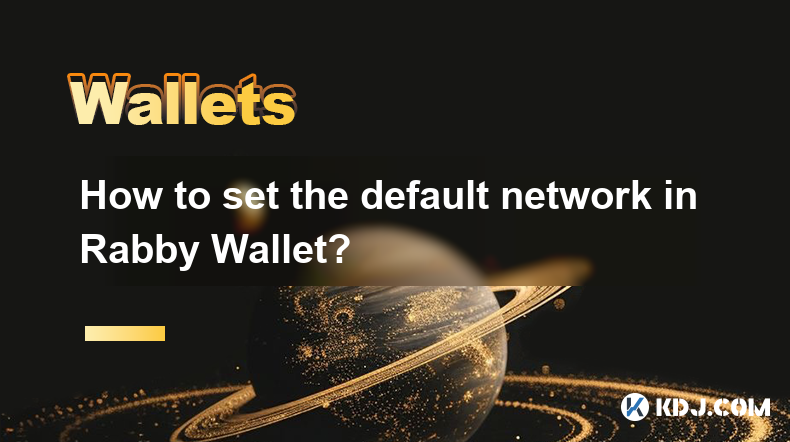
How to set the default network in Rabby Wallet?
Apr 04,2025 at 06:35am
Setting the default network in Rabby Wallet is a crucial step for users who frequently interact with different blockchain networks. This guide will walk you through the process of setting your preferred network as the default, ensuring a seamless experience when managing your cryptocurrencies. Whether you're using Ethereum, Binance Smart Chain, or any o...
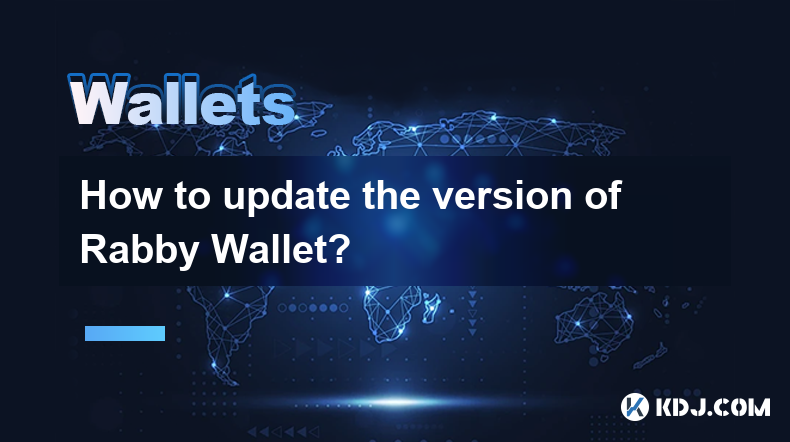
How to update the version of Rabby Wallet?
Apr 05,2025 at 02:14am
Updating the version of Rabby Wallet is an essential task to ensure you have the latest features, security enhancements, and bug fixes. This guide will walk you through the process of updating Rabby Wallet on different platforms, including desktop and mobile devices. Let's dive into the detailed steps for each platform. Updating Rabby Wallet on DesktopU...
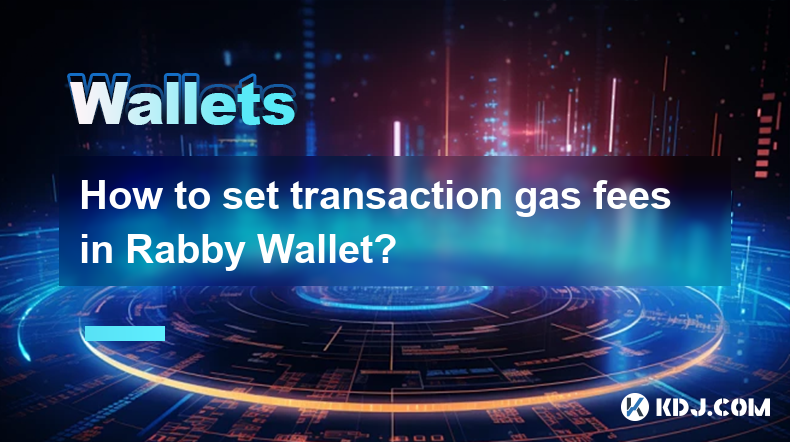
How to set transaction gas fees in Rabby Wallet?
Apr 05,2025 at 02:29pm
How to set transaction gas fees in Rabby Wallet?Rabby Wallet is a versatile tool for managing cryptocurrency transactions, offering users the flexibility to customize gas fees according to their preferences. Setting the right transaction gas fees is crucial for ensuring your transactions are processed efficiently and economically. This guide will walk y...
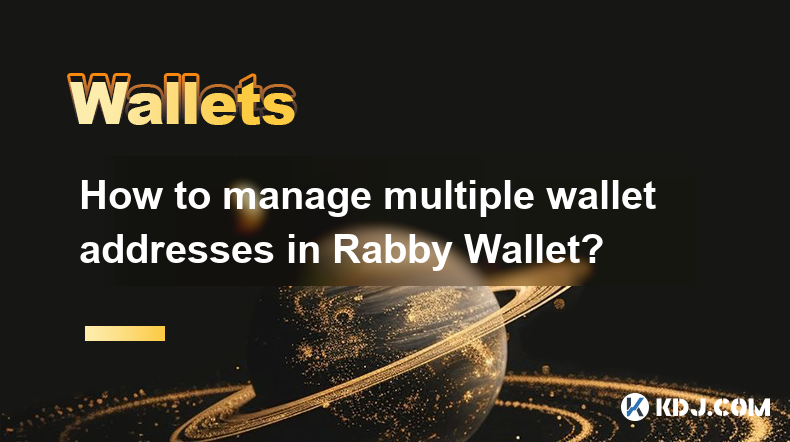
How to manage multiple wallet addresses in Rabby Wallet?
Apr 05,2025 at 07:14am
Managing multiple wallet addresses in Rabby Wallet can significantly enhance your cryptocurrency management experience. Whether you're a seasoned crypto enthusiast or a beginner, understanding how to efficiently handle multiple addresses can streamline your transactions and improve your security. In this article, we will explore the detailed steps and b...

How do I contact Rabby Wallet support?
Apr 04,2025 at 08:42am
Introduction to Rabby Wallet SupportIf you are a user of Rabby Wallet and need assistance, knowing how to contact their support team is crucial. Rabby Wallet offers various methods to reach out for help, ensuring that users can get the support they need efficiently. This article will guide you through the different ways to contact Rabby Wallet support, ...

How do I set up a multi-signature wallet in Rabby Wallet?
Apr 05,2025 at 06:49pm
Setting up a multi-signature wallet in Rabby Wallet involves several detailed steps to ensure security and functionality. A multi-signature wallet requires multiple private keys to authorize a transaction, adding an extra layer of security. Here's a comprehensive guide on how to set up a multi-signature wallet in Rabby Wallet. Understanding Multi-Signat...

How to set the default network in Rabby Wallet?
Apr 04,2025 at 06:35am
Setting the default network in Rabby Wallet is a crucial step for users who frequently interact with different blockchain networks. This guide will walk you through the process of setting your preferred network as the default, ensuring a seamless experience when managing your cryptocurrencies. Whether you're using Ethereum, Binance Smart Chain, or any o...

How to update the version of Rabby Wallet?
Apr 05,2025 at 02:14am
Updating the version of Rabby Wallet is an essential task to ensure you have the latest features, security enhancements, and bug fixes. This guide will walk you through the process of updating Rabby Wallet on different platforms, including desktop and mobile devices. Let's dive into the detailed steps for each platform. Updating Rabby Wallet on DesktopU...

How to set transaction gas fees in Rabby Wallet?
Apr 05,2025 at 02:29pm
How to set transaction gas fees in Rabby Wallet?Rabby Wallet is a versatile tool for managing cryptocurrency transactions, offering users the flexibility to customize gas fees according to their preferences. Setting the right transaction gas fees is crucial for ensuring your transactions are processed efficiently and economically. This guide will walk y...

How to manage multiple wallet addresses in Rabby Wallet?
Apr 05,2025 at 07:14am
Managing multiple wallet addresses in Rabby Wallet can significantly enhance your cryptocurrency management experience. Whether you're a seasoned crypto enthusiast or a beginner, understanding how to efficiently handle multiple addresses can streamline your transactions and improve your security. In this article, we will explore the detailed steps and b...
See all articles





















































































